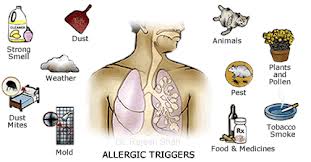What Environmental Factors Cause Asthma
Asthma is something that most of us are familiar with, but may not know the whole story behind. Did you know that asthma is actually a chronic respiratory disease that affects approximately 339 million people worldwide? That's a staggering number! While it is a common condition, it is important to understand the real causes of asthma and ways to cure it. In this article, we will explore this topic in depth and uncover some lesser-known details about the causes of asthma and how to treat it.
What is Asthma?
Asthma is a chronic respiratory disease that causes inflammation and constriction of the airways. This inflammation and constriction make it difficult for air to pass through the lungs, leading to symptoms such as wheezing, coughing, and difficulty breathing. Asthma attacks can be triggered by a variety of factors, including allergies, exercise, stress, and environmental factors such as pollution or cold air.
The Real Causes of Asthma
There is no one specific cause of asthma, but it is thought to be a combination of genetic and environmental factors. Some common factors that can contribute to the development of asthma include:
- Allergies: Allergic reactions to pollen, dust mites, animal dander, and other allergens can trigger asthma symptoms in those who are susceptible.
- Environmental pollution: Exposure to air pollution and other environmental toxins can irritate the airways and trigger asthma symptoms.
- Respiratory infections: Infections of the respiratory system, such as colds and flu, can trigger asthma symptoms in some individuals.
- Stress: Emotional stress can trigger asthma attacks in some people.
While these are some of the most common factors that can contribute to the development of asthma, it is important to remember that asthma is a complex condition that can be caused by a variety of factors. Some people may be predisposed to develop asthma due to genetic factors, while others may develop the condition as a result of environmental factors.
Curing Asthma
While there is currently no cure for asthma, there are a variety of treatments available that can help manage the condition. The most common treatments for asthma include:
- Inhalers: Inhalers are a commonly prescribed treatment for asthma and work by delivering medication directly to the airways to relieve symptoms.
- Corticosteroids: Corticosteroids are a type of medication that helps to reduce inflammation in the airways. These medications are usually prescribed for more severe cases of asthma.
- Allergy shots: Allergy shots, also known as immunotherapy, can be an effective way to manage allergies that trigger asthma symptoms.
- Lifestyle changes: Making lifestyle changes such as quitting smoking, reducing exposure to environmental toxins, and managing stress can also help manage asthma symptoms.
It is important to work with a qualified healthcare provider to develop a personalized treatment plan for asthma that takes into account your individual symptoms and triggers.
Conclusion
Asthma is a chronic respiratory disease that affects millions of people worldwide. While it can be a difficult condition to live with, there are a variety of treatments available that can help manage symptoms. Understanding the real causes of asthma, such as allergies, environmental factors, and respiratory infections, can help individuals better manage their condition. Whether you are newly diagnosed with asthma or have been living with the condition for years, remember that there is hope and that with proper treatment and management, you can live a happy and full life.
Image sources
Image 1

Image source: Assignment Point
Image 2
Image source: Redcare